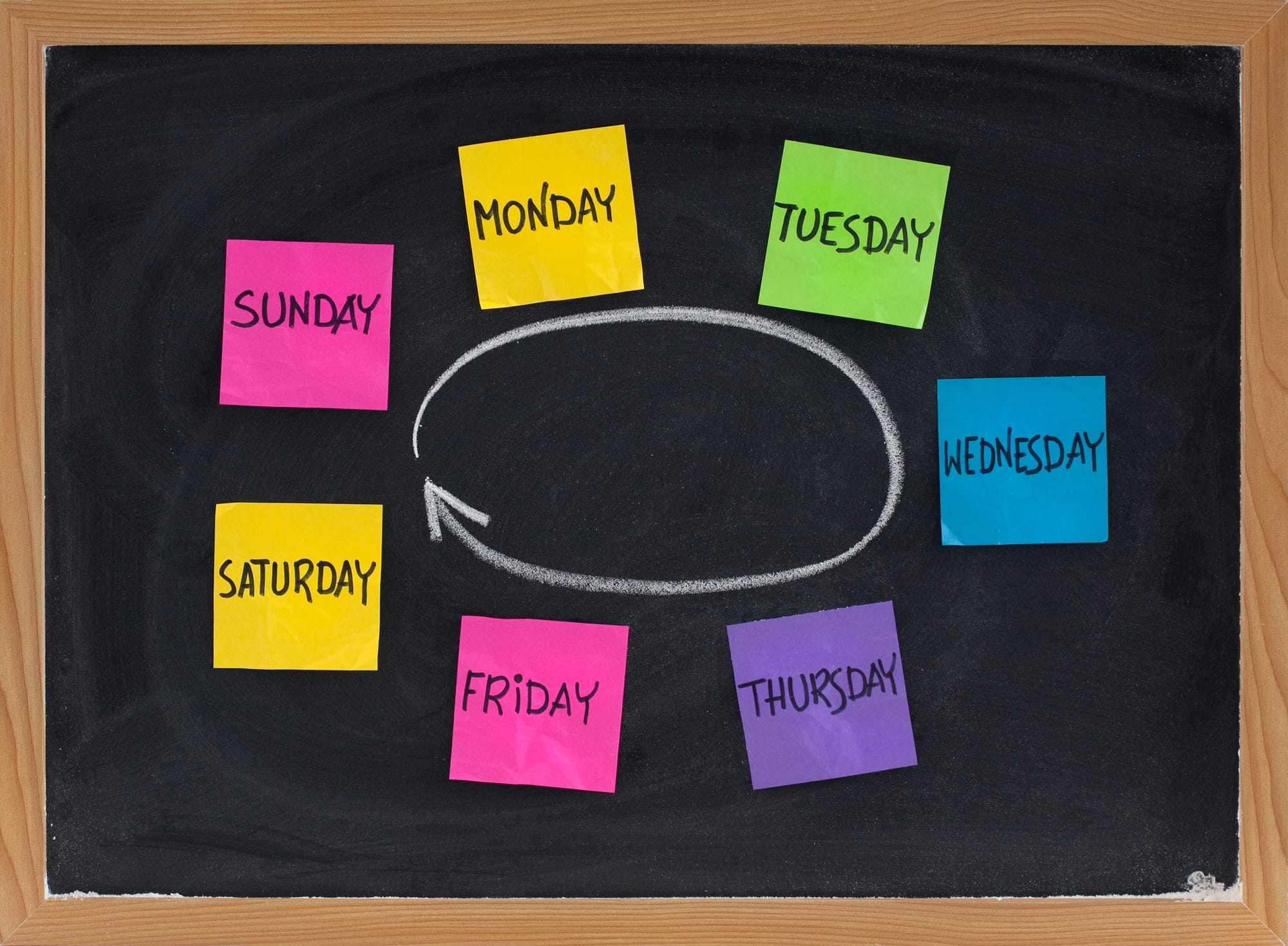Essential German Vocabulary: Days of the Week, Months, and Seasons
• public
Hallo, language learners! Ready to take your first steps into the wonderful world of German? You're in the right place! Today, we're diving into some of the most essential building blocks of the German language: the days of the week, months, and seasons.
Learning these fundamental terms isn't just about memorizing a list (though we'll do that too!). It's about unlocking the door to everyday conversations, understanding German culture, and feeling more confident in your language journey. Whether you're planning a trip to Berlin, chatting with your German pen pal, or simply expanding your linguistic horizons, mastering these basics will give you a solid foundation to build upon.
In this post, we'll explore:
- Die Wochentage (The Days of the Week)
- Die Monate (The Months of the Year)
- Die Jahreszeiten (The Seasons)
Plus, we'll sprinkle in some fun dialogues and practice exercises to help you use these new words in context. So, grab your Lederhosen or Dirndl (just kidding, your comfy learning clothes will do), and let's embark on this German language adventure together!
Ready to start? Lass uns anfangen! (Let's begin!)

Days of the Week (Die Wochentage)
Overview
Knowing the days of the week in German is like having a mini-superpower in your language toolkit. It's not just about marking time; it's about navigating daily life in German-speaking countries with ease. Whether you're making plans with friends, scheduling a business meeting, or simply trying to figure out when the local Biergarten is busiest, mastering die Wochentage is essential.
Fun fact: In Germany, the week officially starts on Monday, not Sunday. This little cultural tidbit might come in handy when you're reading a German calendar or planning your schedule!
The Days of the Week in German
Now, let's dive into the German days of the week. Don't worry if the pronunciations seem tricky at first – we'll break them down for you:
- Montag (MON-tahk) - Monday
- Dienstag (DEENS-tahk) - Tuesday
- Mittwoch (MIT-vokh) - Wednesday
- Donnerstag (DON-ers-tahk) - Thursday
- Freitag (FRY-tahk) - Friday
- Samstag (ZAMS-tahk) - Saturday
- Sonntag (ZON-tahk) - Sunday
Pro tip: Notice how most of the days end with "-tag"? That's because "Tag" means "day" in German. Clever, right?
Sample Dialogues
Let's put these days into action with some simple conversations:
Dialogue 1: Person A: Was machst du am Montag? (What are you doing on Monday?) Person B: Am Montag gehe ich zur Arbeit. (On Monday, I'm going to work.)
Dialogue 2: Person A: Wann treffen wir uns? (When are we meeting?) Person B: Lass uns am Freitag treffen. (Let's meet on Friday.)
Try reading these dialogues aloud – it's a great way to practice your pronunciation and get comfortable using the days of the week in context.
Remember, practice makes perfect! Why not challenge yourself to say today's day in German? Or plan your week using the German terms? The more you use these words in your daily life, the quicker they'll become second nature.
Next up, we'll explore the months of the year in German. But before we move on, any Fragen (questions) about die Wochentage?
Word Bank: Days of the Week
To help you review and memorize die Wochentage, here's a handy word bank. Try covering the English translations and testing yourself!
| German | English | Pronunciation Guide |
|---|---|---|
| Montag | Monday | MON-tahk |
| Dienstag | Tuesday | DEENS-tahk |
| Mittwoch | Wednesday | MIT-vokh |
| Donnerstag | Thursday | DON-ers-tahk |
| Freitag | Friday | FRY-tahk |
| Samstag | Saturday | ZAMS-tahk |
| Sonntag | Sunday | ZON-tahk |
Tip: Try creating mnemonic devices or associations to help remember each day. For example, "Mittwoch" (Wednesday) literally means "mid-week" in German!

Months of the Year (Die Monate)
Overview
Mastering the months in German isn't just about filling in your Kalender (calendar). It's your ticket to discussing everything from birth dates to holiday plans, and even understanding those tricky expiration dates on your favorite German snacks!
In Germany, as in many other countries, the months play a big role in cultural events and festivities. For instance, Oktober isn't just a month – it's when the world-famous Oktoberfest takes place. And Dezember? That's when you'll find enchanting Weihnachtsmärkte (Christmas markets) in town squares across the country.
The Months in German
Let's dive into die Monate. You might notice some similarities with English – can you spot them?
- Januar (ya-NOO-ar) - January
- Februar (fe-BROO-ar) - February
- März (merts) - March
- April (a-PRIL) - April
- Mai (my) - May
- Juni (YOO-nee) - June
- Juli (YOO-lee) - July
- August (ow-GOOST) - August
- September (zep-TEM-ber) - September
- Oktober (ok-TOH-ber) - October
- November (no-VEM-ber) - November
- Dezember (de-TSEM-ber) - December
Pro tip: In German, the names of the months are not capitalized unless they're at the beginning of a sentence. It's just another quirky rule to keep you on your toes!
Sample Dialogues
Let's see these months in action with some everyday conversations:
Dialogue 1: Person A: Wann hast du Geburtstag? (When is your birthday?) Person B: Ich habe im April Geburtstag. (My birthday is in April.)
Dialogue 2: Person A: In welchem Monat reisen wir nach Deutschland? (In which month are we traveling to Germany?) Person B: Wir reisen im August. (We are traveling in August.)
Word Bank: Months of the Year
Here's a handy reference table to help you review:
| German | English | Pronunciation Guide |
|---|---|---|
| Januar | January | ya-NOO-ar |
| Februar | February | fe-BROO-ar |
| März | March | merts |
| April | April | a-PRIL |
| Mai | May | my |
| Juni | June | YOO-nee |
| Juli | July | YOO-lee |
| August | August | ow-GOOST |
| September | September | zep-TEM-ber |
| Oktober | October | ok-TOH-ber |
| November | November | no-VEM-ber |
| Dezember | December | de-TSEM-ber |
Challenge yourself: Try saying your birth month in German, or naming the current month. Better yet, see if you can list all twelve months without peeking!
Remember, learning these words opens up a world of possibilities in your German conversations. Whether you're talking about your summer vacation plans or discussing historical events, knowing die Monate will make you sound more fluent and confident.

Seasons of the Year (Die Jahreszeiten)
Overview
Ah, die Jahreszeiten! The seasons are not just a way to mark the passing of time in German-speaking countries; they're deeply woven into the culture, traditions, and daily life. From the blooming Frühlingsblumen (spring flowers) to the cozy Winterabende (winter evenings), each season brings its own flavor to the German experience.
Understanding and using the German words for seasons will help you discuss weather, plan activities, and participate in seasonal traditions. Plus, you'll be able to join in when Germans start their favorite pastime: talking about the weather!
The Seasons in German
Let's explore die vier Jahreszeiten (the four seasons):
- Frühling (FROO-ling) - Spring
- Sommer (ZO-mer) - Summer
- Herbst (herbst) - Autumn/Fall
- Winter (VIN-ter) - Winter
Remember, in German, nouns are capitalized, so don't forget to capitalize your seasons!
Fun fact: Germans have a saying "Kein Wetter ist auch ein Wetter" (No weather is also a type of weather), showing just how much they love discussing the seasons and weather!
Sample Dialogues
Let's see how we can use these seasonal terms in everyday conversations:
Dialogue 1: Person A: Welche Jahreszeit magst du am liebsten? (Which season do you like the most?) Person B: Ich mag den Sommer am liebsten. (I like summer the most.)
Dialogue 2: Person A: Was machst du im Winter? (What do you do in winter?) Person B: Im Winter fahre ich Ski. (In winter, I go skiing.)
Word Bank: Seasons of the Year
Here's a quick reference table for die Jahreszeiten:
| German | English | Pronunciation Guide |
|---|---|---|
| Frühling | Spring | FROO-ling |
| Sommer | Summer | ZO-mer |
| Herbst | Autumn/Fall | herbst |
| Winter | Winter | VIN-ter |
Tip: To help remember these, think about what each season brings in Germany:
- Frühling: Flowers blooming and trees budding
- Sommer: Biergarten visits and outdoor festivals
- Herbst: Colorful foliage and Oktoberfest
- Winter: Christmas markets and skiing in the Alps
3.5. Seasonal Traditions in Germany
Each season in Germany comes with its own unique traditions:
- Frühling: Easter markets and Maifeste (May Day celebrations)
- Sommer: Open-air concerts and Grillpartys (barbecues)
- Herbst: Wine festivals and, of course, Oktoberfest
- Winter: Weihnachtsmärkte (Christmas markets) and Silvester (New Year's Eve) celebrations
Try using these season names when discussing your favorite activities or planning your next trip to a German-speaking country!
Remember, mastering these seasonal terms will not only improve your German language skills but also deepen your understanding of German culture. So, whether you're a Sommertyp (summer person) or you prefer the cozy Winterzeit (wintertime), you're now equipped to talk about it in German!
Welche Jahreszeit ist deine Lieblingsjahreszeit? (Which season is your favorite season?)

Practice Exercises
Now that we've covered the days of the week, months, and seasons in German, let's put your knowledge to the test with some fun and engaging exercises!
- Matching Exercise: Match the German days of the week with their English equivalents.
a) Dienstag 1) Sunday b) Freitag 2) Wednesday c) Sonntag 3) Friday d) Mittwoch 4) Tuesday
- Fill-in-the-Blank: Complete the sentences with the correct month or day.
a) Der erste Monat des Jahres ist ______. (The first month of the year is ______.) b) Nach Frühling kommt der _______. (After spring comes _______.) c) Am _______ ist das Wochenende zu Ende. (On _______, the weekend ends.) d) Weihnachten feiern wir im _______. (We celebrate Christmas in _______.)
- Translation Exercise: Translate these short phrases from English to German.
a) I go swimming in summer. b) My favorite day is Saturday. c) The leaves fall in autumn. d) January is the coldest month.
- Conversation Practice: With a partner or imaginary friend, create a short dialogue using the days of the week and months. For example, plan a week's schedule or discuss plans for different months. Here's a starter:
A: Wann hast du Zeit, ins Kino zu gehen? B: Wie wäre es am _______? A: _______ passt mir leider nicht. Können wir am _______ gehen?
- Writing Exercise: Write a short paragraph (3-5 sentences) about your favorite season and why you like it, using the German vocabulary we've learned. Here's an example to get you started:
Meine Lieblingsjahreszeit ist der Herbst. Die Blätter werden bunt, und das Wetter ist kühl...
Remember, practice makes perfect! Don't worry if you make mistakes - they're a natural part of the learning process. The more you use these words, the more comfortable you'll become with them.

Conclusion
Herzlichen Glückwunsch! (Congratulations!) You've just taken a big step in your German language journey. By learning the days of the week, months, and seasons in German, you've equipped yourself with essential vocabulary that will help you navigate daily life in German-speaking countries or conversations with German speakers.
Let's recap what we've covered:
- Die Wochentage: From Montag to Sonntag, you can now talk about your weekly schedule in German.
- Die Monate: You're ready to discuss dates, plan trips, and understand German calendars.
- Die Jahreszeiten: You can describe your favorite time of year and understand seasonal traditions in German-speaking cultures.
Remember, language learning is a journey, not a destination. Don't be discouraged if you don't memorize everything right away. Regular practice and real-world application are key to mastering these new words and phrases.
Here are some tips to keep improving:
- Use a German calendar app on your phone to see the days and months in German regularly.
- Try changing the language settings on your devices to German for extra practice.
- Start a German journal where you write the date in German and describe the day's weather or season.
The more you engage with the language, the more natural it will become. Whether you're planning a trip to a German-speaking country, preparing for a language exam, or simply expanding your linguistic horizons, these foundational terms will serve you well.
Remember, jede Reise beginnt mit dem ersten Schritt (every journey begins with the first step). You've already taken that step, so keep going! Before you know it, you'll be conversing in German with confidence.
Viel Glück und viel Spaß beim Deutschlernen! (Good luck and have fun learning German!)

Frequently Asked Questions (FAQ)
- Q: Why is "Mittwoch" (Wednesday) different from other days of the week in German? A: Unlike other days that end with "-tag", "Mittwoch" literally means "mid-week". It comes from the Old High German words "mitta" (middle) and "wecha" (week).
- Q: Are months capitalized in German? A: No, months are not capitalized in German unless they appear at the beginning of a sentence. This is different from English, where months are always capitalized.
- Q: How do Germans typically write the date? A: In Germany, the typical date format is day.month.year. For example, 15.07.2023 would be July 15, 2023.
- Q: Is there a German equivalent to Daylight Saving Time? A: Yes, Germany observes Daylight Saving Time. It's called "Sommerzeit" (summer time) in German.
- Q: Are there any unique seasonal celebrations in German-speaking countries? A: Yes, there are many! Some examples include Oktoberfest in autumn, Weihnachtsmärkte (Christmas markets) in winter, and Maifeste (May Day celebrations) in spring.
- Q: How do I say "What's the weather like?" in German? A: You can ask "Wie ist das Wetter?" This is a common phrase used to discuss the weather, which often relates to seasons.
- Q: Is there a difference between "Samstag" and "Sonnabend"? A: Both words mean "Saturday". "Samstag" is more commonly used in southern Germany and Austria, while "Sonnabend" is more prevalent in northern Germany.
- Q: How do I remember the genders of the seasons in German? A: "Der Frühling", "der Sommer", and "der Winter" are masculine, while "der Herbst" can be either masculine or neuter (der/das Herbst).
